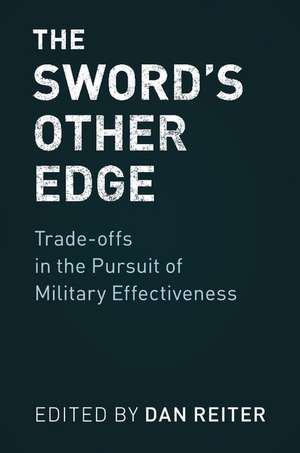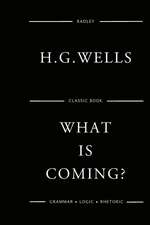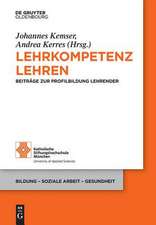The Sword's Other Edge: Trade-offs in the Pursuit of Military Effectiveness
Editat de Dan Reiteren Limba Engleză Hardback – 8 noi 2017
| Toate formatele și edițiile | Preț | Express |
|---|---|---|
| Paperback (1) | 261.86 lei 3-5 săpt. | |
| Cambridge University Press – 8 noi 2017 | 261.86 lei 3-5 săpt. | |
| Hardback (1) | 554.68 lei 6-8 săpt. | |
| Cambridge University Press – 8 noi 2017 | 554.68 lei 6-8 săpt. |
Preț: 554.68 lei
Preț vechi: 623.24 lei
-11% Nou
Puncte Express: 832
Preț estimativ în valută:
106.15€ • 115.26$ • 89.17£
106.15€ • 115.26$ • 89.17£
Carte tipărită la comandă
Livrare economică 22 aprilie-06 mai
Preluare comenzi: 021 569.72.76
Specificații
ISBN-13: 9781108416726
ISBN-10: 1108416721
Pagini: 288
Ilustrații: 10 b/w illus. 5 tables
Dimensiuni: 157 x 235 x 21 mm
Greutate: 0.52 kg
Editura: Cambridge University Press
Colecția Cambridge University Press
Locul publicării:Cambridge, United Kingdom
ISBN-10: 1108416721
Pagini: 288
Ilustrații: 10 b/w illus. 5 tables
Dimensiuni: 157 x 235 x 21 mm
Greutate: 0.52 kg
Editura: Cambridge University Press
Colecția Cambridge University Press
Locul publicării:Cambridge, United Kingdom
Cuprins
1. Confronting tradeoffs in the pursuit of military effectiveness Dan Reiter; 2. Force protection and its tradeoffs Emanuele Castelli and Lorenzo Zambernardi; 3. War finance and military effectiveness Rosella Cappella Zielinski; 4. Forced to fight: coercion, blocking detachments, and tradeoffs in military effectiveness Jason Lyall; 5. Sources of military effectiveness in counterinsurgency: evidence from the Philippines Joseph Felter; 6. Military robotics, autonomous systems, and the future of military effectiveness Michael C. Horowitz; 7. Too much of a good thing? Conventional military effectiveness and the dangers of nuclear escalation Caitlin Talmadge; 8. Making tradeoffs without assessing probabilities: the costs and benefits of vague information in national security decision making Jeffrey A. Friedman; 9. Conclusion: the complexity of military effectiveness Filippo Andreatta.
Recenzii
'The Sword's Other Edge presents a path-breaking new perspective on how states and non-state actors pursue military effectiveness, focusing on tradeoffs they often must confront. Previous work focusses either on gains or losses in effectiveness that technologies and tactical innovations provide. This new volume presents a coherent approach to understanding the net effect on effectiveness of changes in the ways that states employ military power. The authors provide insights into critical dimensions of contemporary foreign policy issues, including drone strikes, military robotics, counterinsurgency, ISIS, nuclear weapons, rising military threats from Russia, and others. The chapters and examples are filled with rich historical depth, including case studies of World War II, the 1973 Yom Kippur War, the Korean War, and others, as well as quantitative analyses of the ongoing Philippine insurgency, and of all conventional wars since 1800. A must-read for students, policy makers, and concerned citizens.' Allan C. Stam, Frank Batten School of Leadership and Public Policy, University of Virginia
'How should states employ force? Eschewing simplistic arguments, this fascinating volume studies the tradeoffs militaries inevitably struggle with. From financing, to force mix, to tactics, the chapters show us that there is no free lunch in war; every choice has costs and benefits. Policymakers would do well to heed the lessons in this volume.' Jacob N. Shapiro, Princeton University, New Jersey
'The Sword's Other Edge is a must-read for students of war. For starters, it does a fine job showing that military effectiveness is a function of a host of different factors, which are nicely catalogued in the book. Moreover, it makes clear that maximizing military effectiveness often involves significant costs, and thus policymakers and strategists need to think hard about the resulting tradeoffs. Toward that end, Reiter and his fellow contributors provide a first-rate framework for analyzing the various tradeoffs that arise when a country tries to employ its fighting forces in the most effective way possible.' John J. Mearsheimer, R. Wendell Harrison Distinguished Service Professor of Political Science, University of Chicago
'An excellent read for advanced students of military theory or the history of warfare, and policy makers.' D. N. Nelson, Choice
'How should states employ force? Eschewing simplistic arguments, this fascinating volume studies the tradeoffs militaries inevitably struggle with. From financing, to force mix, to tactics, the chapters show us that there is no free lunch in war; every choice has costs and benefits. Policymakers would do well to heed the lessons in this volume.' Jacob N. Shapiro, Princeton University, New Jersey
'The Sword's Other Edge is a must-read for students of war. For starters, it does a fine job showing that military effectiveness is a function of a host of different factors, which are nicely catalogued in the book. Moreover, it makes clear that maximizing military effectiveness often involves significant costs, and thus policymakers and strategists need to think hard about the resulting tradeoffs. Toward that end, Reiter and his fellow contributors provide a first-rate framework for analyzing the various tradeoffs that arise when a country tries to employ its fighting forces in the most effective way possible.' John J. Mearsheimer, R. Wendell Harrison Distinguished Service Professor of Political Science, University of Chicago
'An excellent read for advanced students of military theory or the history of warfare, and policy makers.' D. N. Nelson, Choice
Descriere
Military effectiveness can only be fully understood by accounting for its political and military tradeoffs. This book explains those tradeoffs.

























